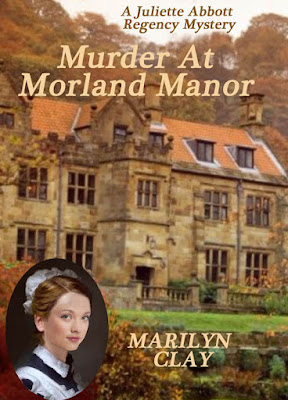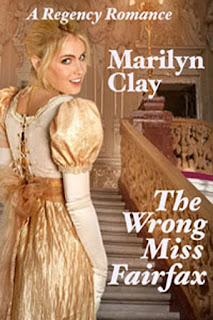Actually, with my new Regency Mystery release, Murder at Morland Manor, there are two “somethings” I have never done before. One, even though I’ve written more than twenty books, I had never before written an entire novel using first person viewpoint and two, I had never before written a Regency-set mystery. Not sure “why” I wanted to write a mystery set in the Regency period, it was just an idea that had been churning around in my mind for a while.
So, when I finished writing The Wrong Miss Fairfax, a traditional Regency Romance released in print and e-book in January 2016, which I also wrote in first person although I switched back and forth from the heroine to the hero and found it a lot of fun, I was already in that mind-set so I began my Morland Manor mystery the same way except that I stayed exclusively in the heroine’s viewpoint. Partly because there is no hero, per se, although Juliette, being young and attractive, does notice the gentlemen in the story and she does find one more appealing than the others, still there is no real hero in this Regency-set murder mystery.
Back when I first started writing, I remember it helped me to “get into my character’s head” if I first wrote out her internal dialog in first person and then when I felt comfortable with her (or his) feelings and emotions I would rewrite everything in third person. Now that I’ve completed two books in first person, I find I like the discipline. With first person your main character must be in every scene and you cannot “show” or “reveal” anything to the reader that your character isn’t looking at, or thinking about. To maintain that degree of focus as a writer can sometimes be a challenge since you have to figure out ways that she can “learn” something that did not happen while she was right there on the premises. With third person, and certainly with omniscient viewpoint, you (the author) can take your readers all over the place. With first person, the viewpoint is by definition limited. However, a pitfall for the writer is to think it’s okay to reveal every little thing she is thinking about, but you have to remember to sift through her random thoughts and choose only those that apply to the situation at hand and that move the story forward.
My next choice as I began to set up my Regency-set mystery was to decide “when”, as in exactly what year, the story would take place. Because I knew that this plot, meaning the murder and solving the crime, would happen within a scant fortnight, I did not want to choose a year in which a lot was happening in England politically. I did not want political events, such as the war, or the death of a royal, to overshadow the heightened drama and emotional angst that the murder itself would create for my characters, i.e. I did not want anything to distract anyone, so I chose a two-week period in the fall of 1820.
To be certain that this was the exact time period I wanted to go with, I consulted my stack of back issues of The Regency Plume Newsletter, which I must say still come in handy even though the publisher (oh wait, that’s me!) is no longer publishing. I re-read every Regency Plume article containing information that would add details and authenticity to my story, such as how the Bow Street Runners operated, the English judicial system, who was sent to what prison and exactly where it was located, and more. I needed to know what happened when one merely suspecteda person of having committed a crime, how to go about having them arrested and what happened to the criminal afterward such as, where was a suspect held over for trial? Exactly who made the arrest? In a small village in the English countryside was there a great difference between a constable and a magistrate? Would there even be a magistrate in, or nearby, a small village? And what about a medical examiner? Would one of them also be called in, and what did he do?
I also went on-line and looked up a period calendar for October 1820 so when I noted the date at the beginning of a chapter, I would be putting in the correct day, such as Saturday 14 October and so on. In some cases, little details like these don’t stump a writer until she comes face-to-face with them while she’s writing the book, but then, you have to abandon your story while you go in search of the answer. I like to anticipate what sort of information I’ll need and have the answers at my fingertips before I even start writing. Of course, I never think of everything, but I do my best. And, having all those little notes I write to myself scattered here and there amid back issues of The Regency Plume, which are generally strewn across several thick books open to a particular page containing information I anticipate needing, does make for a pretty messy desk, but . . . I live with it. And when I finish the book, I sort through everything so at least when I’m ready to start another book, I begin with fresh notes that apply only to the new story.
For this particular book, Murder at Morland Manor, I knew I would have at least five young ladies at the house party at Morland Manor who would be from aristocratic families, so I wanted to be certain that I got their titles correct and also those of their parents. You’d think that by now, this would not be an issue, but hey, I’m an American and much about the British title system is still Greek to me, so I also dug out those Regency Plume articles written by the late Jo Beverley and other fabulous Regency authors on English titles and made my choices. In the list of characters that I put at the beginning of my book, I included little notes for readers on English titles and why different ranks were addressed in the manner they are.
I also chose personalities and physical characteristics for each of the young ladies and attempted to give them and their lady’s maids enough differences that it would not be difficult for readers to keep the characters straight. So, that meant no two names that began with the same letter; not all of the girls are blonde with blue eyes, or all petite, or even all pretty. I admit I was half way through writing the book before I quit consulting my cheat sheet on the characters and remembered who was who.
The next thing I had to decide was the age of my lead character Juliette Abbott. Since I intend this to be an on-going series, I knew Juliette would be solving a number of murders so I decided to have her start out young and age as each story unfolds, rather than have her be in her twenties in the first book and “on the shelf” by book three or four. At the end of Murder at Morland Manor Juliette is on her way . . . oh, I guess I shouldn’t give away the ending of the story. Anyhow . . . the next book in the series picks up right where this one leav
es off. I hope you’ll want to follow along and find out what crime Miss Juliette Abbott is obliged to solve next.
es off. I hope you’ll want to follow along and find out what crime Miss Juliette Abbott is obliged to solve next.
I will tell you this much, the next story in the Juliette Abbott Regency Mystery Series takes place in London. In the meantime, you can become acquainted with Juliette Abbott in Murder at Morland Manor available from most online e-book sites and also in print here or from Amazon.
If you’d like to read more about my other Regency romance novels, or my Colonial American historical suspense novels, DANGEROUS DECEPTIONS or DANGEROUS SECRETS, both published a few years ago in hardcover, or about my BETSY ROSS : ACCIDENTAL SPY story, please visit my author website here. Of course, all these titles and more are also available on Amazon and other online e-book sites.
Happy Reading everyone!
Marilyn Clay



I'll definitely have to checkout the Juliette Abbott Regency Mystery Series. I've been reading lots of Victorian mystery series, also set in first POV from the heroines and quite enjoy them. Though I do miss getting inside the heads of the heroes, it's a great touch to the mystery not knowing what the hero/love interest thinks of the heroine.
Your book sounds wonderful! I love Regency and while I prefer romances, I do like a good mystery too!
I do love the research part of writing Regencies, but it can be a rabbit-hole from whence one may never return! Brava on writing in first person. It is a definite skill and I do so admire those who can do it. And I love a Regency mystery written in first person because it puts you right in the action, as if you are tagging along and helping to solve the mystery!
I love the sound of your new series, Marilyn. I'll definitely check it out. And I envy you your complete set of the Regency Plume. Mine are scattered all over the place, and I couldn't put my hands on even one issue!